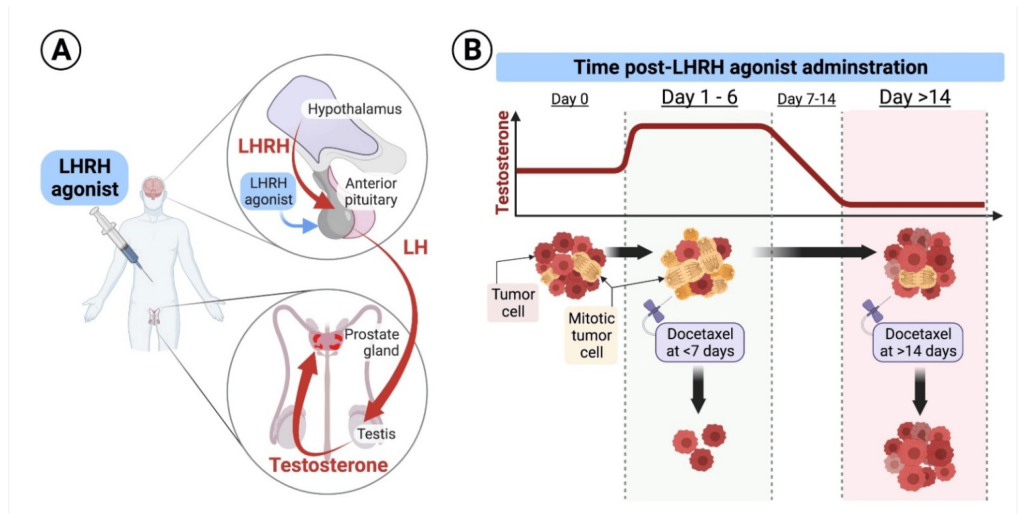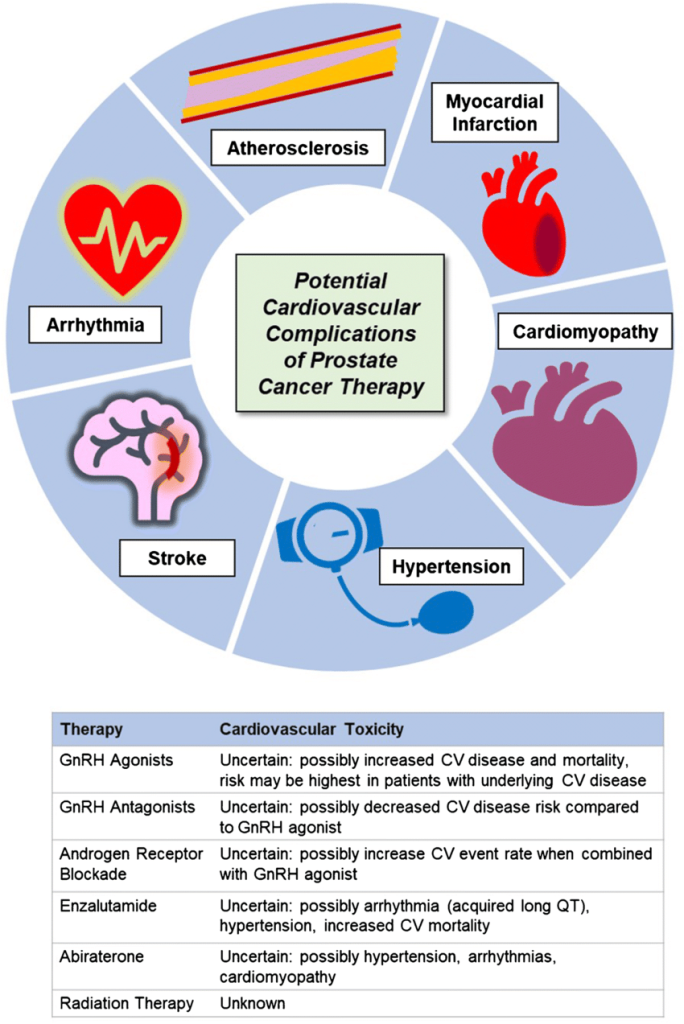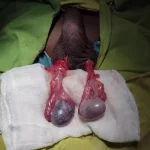Hormone therapy is a possible treatment for prostate cancer. Sometimes it is also called anti hormone therapy.
What is hormone therapy?
Hormones occur naturally in your body. They control the growth and activity of normal cells. Testosterone is a male hormone mainly made by the testicles.
Prostate cancer usually depends on testosterone to grow. Hormone therapy blocks or lowers the amount of testosterone in the body.
Hormone therapy on its own doesn’t cure prostate cancer. But it can lower the risk of an early prostate cancer coming back when you have it with other treatments. Hormone therapy is also a possible treatment for prostate cancer that has spread to other parts of the body. This is metastatic or advanced prostate cancer.
When you might have hormone therapy
You might have hormone therapy with radiotherapy with the aim to cure prostate cancer. This is usually for prostate cancer that:
- hasn’t spread outside the prostate gland. This is localised prostate cancer
- has spread into the tissues around the prostate gland. This is locally advanced prostate cancer
Doctors in the UK recommend the best treatment for you depending on your risk group. They may use a system called the Cambridge Prognostic Group (CPG).
Your doctor might recommend you have hormone therapy in combination with radiotherapy if you have a CPG 2, 3, 4 and 5 localised or locally advanced prostate cancer.
You might have hormone therapy before, during and after radiotherapy. Hormone therapy before radiotherapy is also called neo adjuvant therapy. Hormone therapy after radiotherapy is called adjuvant therapy.
Doctors usually recommend that you have the treatment for between 4 months and 3 years. How long you have treatment depends on the risk of your cancer coming back and how many side effects you get.
Hormone therapy alone
Hormone therapy alone doesn’t cure prostate cancer. Your doctor might recommend hormone treatment alone if:
- the cancer is too advanced to have treatment with the aim to cure it
- you can’t have surgery or radiotherapy because of other health problems
- you don’t want to have radiotherapy or surgery
You usually have hormone therapy for as long as it is working or your doctor might suggest you have intermittent hormone therapy. This is when you have breaks from treatment and have blood tests every 3 months to check your PSA. You restart treatment again if your PSA rises above a certain level.
Metastatic prostate cancer
Hormone therapy is also a treatment for metastatic prostate cancer. You might have it with chemotherapy such as docetaxel. You may also have some hormone therapies such as abiraterone with:
- steroids called prednisolone
- other types of hormone therapies such as enzalutamide and apalutamide
Hormone therapy if your cancer comes back after treatment
Hormone therapy is also a possible treatment if your cancer comes back after having radiotherapy or surgery. This is recurrent prostate cancer.
Types of hormone therapy
There are 3 main ways of having hormone therapy. They include:
- injections
- tablets
- surgery
Injections
The injections work by blocking messages from a gland in the brain that tell the testicles to produce testosterone.
At first, the injections may make your symptoms worse. This is called tumour flare. Your doctor will recommend you take an anti androgen tablet such as bicalutamide for the first 4 to 6 weeks of your treatment to stop the tumour flare.
Luteinising hormone-releasing hormone agonists (LHRH agonists or LH blockers)
A gland in the brain called the pituitary gland makes the luteinising hormone (LH). This controls the amount of testosterone made by the testicles. LH blockers stop the production of luteinising hormone, so the testicles stop making testosterone.
At first, the injections may make your symptoms worse. This is called tumour flare. Your doctor might recommend you take an anti androgen tablet such as bicalutamide to stop the tumour flare. You usually take bicalutamide for the first 4 to 6 weeks of your hormone treatment.
Types of LH blockers include:
- leuprorelin (Prostap) – you have this every 4 weeks or 12 week
- goserelin acetate (Zoladex) – you have this every 4 weeks or 12 weeks
- buserelin (Suprefact) – you have this as an injection 3 times a day for 7 days and then a nasal spray 6 times a day
- triptorelin (Decapeptyl) – you have this once a month, 3 monthly or 6 monthly
Gonadotrophin-releasing hormone antagonist or GnRH blocker
This is another type of hormone injection. It stops messages from a part of the brain called the hypothalamus that tells the pituitary gland to produce luteinising hormone. Luteinising hormone tells the testicles to produce testosterone. So GnRH blockers stop the testicles making testosterone.
Your doctor may suggest you have a GnRH blocker called degarelix (Firmagon). You have this every 4 weeks.
Tablets
Hormone therapy tablets are usually anti-androgen tablets or a drug called abiraterone.
Anti androgen tablets
Prostate cancer cells have areas called receptors. Testosterone attaches to these receptors and can encourage cancer cells to divide and grow.
Anti androgen drugs work by attaching themselves to these receptors. This stops testosterone from reaching the prostate cancer cells. Examples of anti androgens include:
- bicalutamide (Casodex) – you take it once a day
- flutamide (Drogenil) – you take it 3 times a day
- enzalutamide (Xtandi) – you take it once a day
- apalutamide (Erleada) – you take it once a day
- cyproterone acetate (Cyprostat) – you take 1 to 3 times a day
Finding out more about hormone treatment drugs
Check what is the name of the hormone treatment with your doctor or nurse, then take a look at our A to Z list of cancer drugs.
Surgery to remove the testicles (orchidectomy)
Surgery to remove your testicles isn’t a common way of lowering the amount of testosterone you make.
You usually only have surgery to remove your testicles if you need your testosterone reduced urgently. For example, if your cancer has spread to your bones and is pressing on your spinal cord, your doctors might want to reduce the amount of testosterone quickly.
Your doctors might also suggest surgery as an option if you don’t want to have injections or tablets.
Checking your hormone therapy is working
You have regular blood tests to check the level of a protein called prostate specific antigen (PSA). PSA is a protein made by both normal and cancerous prostate cells. It is in the blood in small amounts in all men, unless the prostate gland has been completely removed.
You may have some scans during your treatment. This includes scans that you had at the time of diagnosis, such as a CT, MRI and bone scan.
While the hormone therapy is working, the level of PSA should stay stable or may go down. But if prostate cancer starts to grow and develop, the level of PSA may go up. This is usually called hormone resistant prostate cancer or castrate resistant prostate cancer. If this happens, your doctor may need to change your treatment. They will discuss this with you.
Side effects
Side effects of hormone therapy are due to the low levels of testosterone in your body. Many men find that the side effects are often worse at the start of treatment. They usually settle down after a few weeks or months.
Some side effects are common to all hormone therapies for prostate cancer. Others vary from drug to drug. You might not have all of these side effects. Talk to your doctor or nurse about any side effects you have. They can often suggest ways of reducing the side effects and make you feel better.
The main side effects are:
- difficulty getting an erection (impotence)
- hot flushes and sweating
- feeling tired and weak
- breast tenderness
- tumour flare
Side effects of long term treatment are:
- weight gain
- memory problems
- mood swings and depression
- bone thinning (osteoporosis)
- risk of early heart failure





